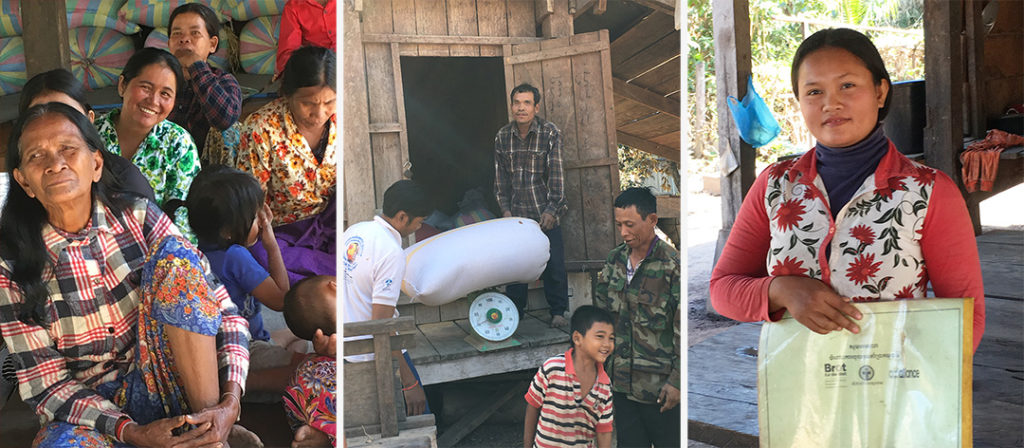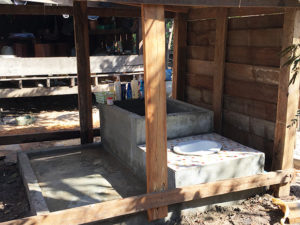
From left to right: The savings group of Yeang commune. Sat Kheang repays the rice bank. Rice bank leader Chuk Layhouy shows the ledger for tracking loans and payments.
It was a beautiful January day with the sun shining brightly and a bit of a chill in the air. We were traveling to Choam Antil village in northern Cambodia near the Thai border where Church World Service has worked since 2008.
As we were going down the bumpy one-lane dirt road – a little over 12 miles from the main road – Mao Sophal, our Country Representative in Cambodia, told me the story of CWS’s work in the area:
According to a Cambodian government statistic in 2006, 80 percent of the people in Choam Antil were living under the poverty level. The community was very isolated, so much so that community members and CWS staff alike had to travel by foot to reach it. It could take up to four hours to reach the village from the main road. There was one marked path, and straying from it was dangerous because they were still clearing landmines from the area.
There was no organization or agency working in this area. In talking with the community leaders during the initial assessment by the CWS team, there was an openness – even an eagerness – to work together to improve the lives of families in the community.
Fast forward to January of 2018. It is amazing to witness what the villagers have accomplished and the pride that they showed in sharing their experiences.
Today, Sin Peu has a plot of land for planting vegetables. He received seedlings and training from CWS and capitalized on that support to create an additional income stream for his family.
Through disease-preventing water and sanitation programs, CWS and the community installed a hand pump and latrine. The community is planning for an electronic pump in the future.
During our visit, Sat Kheang brought rice to repay the village’s rice bank, which was established after 2011 floods led to a food shortage several years ago. Our team provided two tons of rice and worked with the community to establish the rice bank, which now has 83 members. A rice bank is a central collection of rice that members can borrow at a low interest rate when they are facing hard times. Rice banks build community trust while alleviating the need to borrow from predatory lenders and fall further into debt. The rice bank leader, Chuk Layhouy, showed us her ledger for tracking the borrowing from and repayment to the rice bank. The rice bank now is well established and sustainable.
The village’s dam was built during the time of the Khmer Rouge and had fallen into disrepair. With technical and financial support from CWS, the community members repaired the dam. It is now workable, and people have also learned the technique so that they can repair it in the future.
With everything that was shared, it was hearing about the savings group that had the biggest impact on me. With guidance from our team in Cambodia, two savings groups began in 2016 in Choam Antil. The members of the savings groups deposit funds monthly. With the funds collected, families can borrow to meet emergency needs, such as treating sick children and paying for transport to the health clinic.
Members said the most important thing that they received from being a part of the savings group was “the trust and honesty in the group” and “solidarity with one another.” It was inspiring to see how this community had come together and truly was transformed.
As we left Choam Antil Village, the question that kept repeating in my mind was this: what if that kind of transformation happened in communities all around the world and in our neighborhoods? We would have a world where there indeed is enough for all.
Joanne Rendall is the Chief Financial Officer of CWS.

